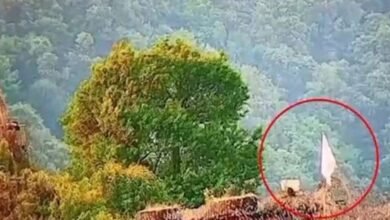
The True Post(Web News) The 12-day operation of the Indian army in the Kulgam district of occupied Jammu and Kashmir not only failed miserably in achieving its objectives.
In fact, the plight of Indian soldiers has raised questions about the military capability and planning of the Indian Army worldwide. According to reports, many Indian soldiers were forced to eat dirt due to hunger and thirst as a result of the long siege and continuous failure. According to the Kashmir Media Service, the operation was launched after a large-scale intelligence report claiming that a strong group of Kashmiri resistance fighters was hiding in the forests and mountainous areas of Kulgam. The Indian Army had claimed that it would “cleanse” the area of rebels in a few days, but the operation turned into a long and complex battle. The
operation involved special commandos of the Indian Army, paramilitary forces, and helicopters of the Air Force. Drone technology and modern weapons were also used. Despite all this, the Indian Army could not achieve the results that were announced at the beginning of the operation. According to sources, the rebels adopted a guerrilla warfare strategy during the operation. They had planted mines in the hills and dense forests, and would change their positions immediately after the attack. The Indian army faced fierce ground resistance and the siege was broken several times.
According to Indian media, 9 Indian soldiers were killed during this time, some of whom were killed in IED explosions while others died in clashes. Another 14 soldiers, including a colonel, were seriously injured. The most attention during this operation was the news that many Indian soldiers were forced to eat dirt due to hunger and thirst. An Indian soldier said in a private message on the last day of the operation that we have been deprived of food and drink for five days. Water reserves have run out and it has become impossible to deliver supplies due to the encirclement in the forest. We are eating soil and leaves to survive.” This revelation is clear evidence of the Indian army’s poor logistical planning and failure to provide basic necessities during the operation. The Indian army used helicopters and drones to tighten the siege and target rebel hideouts, but dense forests and difficult routes limited their effectiveness. Despite rebels being seen in drone footage several times, there was a delay or failure to target them.
According to military experts, this failure indicates that the Indian forces need more training and better tactics to operate effectively in a guerrilla warfare environment.
The resistance fighters not only broke the Indian army’s siege during the operation, but they were also able to move deeper into the jungle. They had limited weapons, but the geography of the area and local support proved to be their biggest weapons.
Local sources say that many villagers provided the rebels with food, water and shelter, due to which the Indian army’s siege became ineffective.
The All Parties Hurriyat Conference termed the Kulgam operation as the “biggest shameful failure” of the Indian army and said that the Modi government was carrying out such military operations to cover up its political failures. Hurriyat leaders said that “no matter how much force the Indian army uses, it cannot succeed in breaking the morale of the Kashmiri people. The failure of Kulgam is proof that India’s military dominance cannot last.” Interestingly, the Indian mainstream media either remained silent on this failure or presented the news as a minor incident. Some independent journalists and social media reports highlighted the incident of soldiers eating soil, which sparked a heated debate in India. The question is being raised on social media that if the Indian army cannot provide food and water to its soldiers, how long will it be able to control the Kashmiri people?
The failure of the Kulgam operation has made it clear that the Indian army does not enjoy public support in occupied Kashmir, but rather the resistance movement continues to receive support at the local level. This failure will not only affect the morale of the Indian army but will also raise questions about India’s military policy at the global level. Local citizens of Kulgam say that this failure is a victory for the determination of the Kashmiri people.




